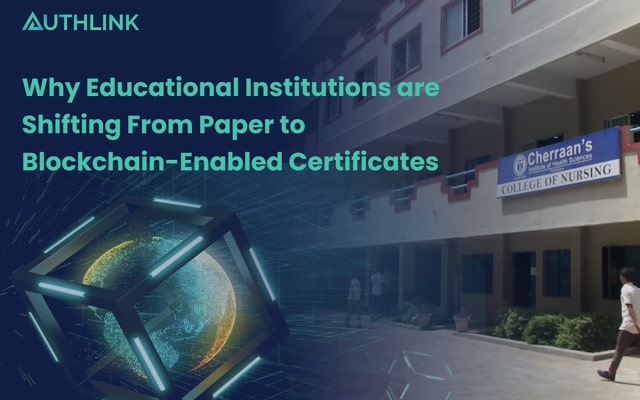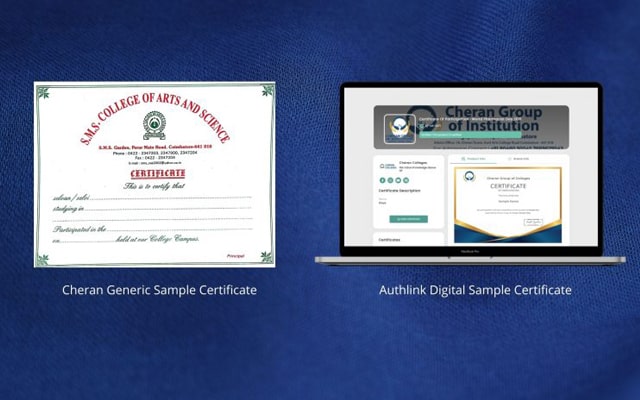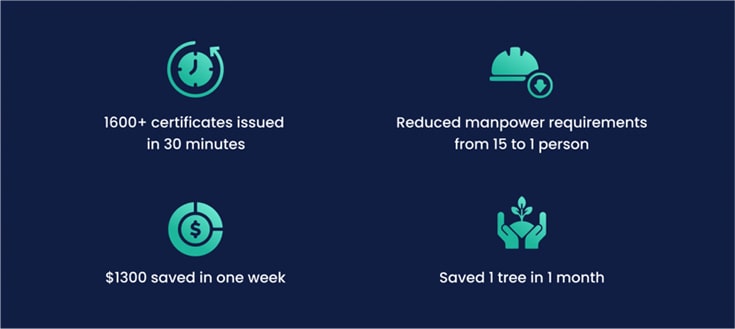Why Educational Institutions are Shifting From Paper to Blockchain-Enabled Certificates?

Reputed educational institutions are testing the waters with digital certificate management systems. Cheran Colleges is taking an innovative approach by switching from traditional paper certificates to blockchain-enabled digital certificates. This move has helped enhance efficiency in their certificate creation, authentication and distribution efforts
The Challenge
Cheran Colleges used to create and issue paper certificates for students. This posed several challenges to both the students and the college administration, particularly during the coronavirus pandemic period.
The following were the major concerns:
1. Delay and steep costs of printing:
It costs around $0.33 to $0.66 to create a single paper certificate, because of which the expenses added up when a mass number of certificates were issued to meet the requirements of multiple college events. Adding security features (such as holograms) to the certificates during printing also drove up costs even though they did not work as expected due to poor methodology. It thus became important to find an alternative to stay within the budget. Similarly, it took a lot of time for college authorities to get each certificate printed and verified. This caused major delays in sharing certificates to students and increased risks of mismanagement as well.
 Source: Building Minds, Minding Buildings
Source: Building Minds, Minding Buildings
2. Authentication issues:
Each paper certificate needs to be authenticated at the administrative office, which tends to be a lengthy process when done manually. Therefore, it took a lot of effort and time for college authorities to accurately verify the data authenticity for the certificates of each student in the college.
3. Risk of forging:
Paper certificates are quite easy to forge, and it is almost impossible to trace each student’s certificate manually to figure out if they have been manipulated at any point.
4. Difficulties faced by students:
Once a student lost his/her paper certificate, there was usually a long wait to get it replaced. This was because paper certificates are not convenient to print, authenticate and share. Each student was required to be present at college to receive their paper certificates. It was too risky to share valuable documents with each student. This left the administrators no choice but to mandate students from across the country to be present at the time of certificate issual. There were also delays caused due to the requirement of getting the certificates signed from several departments.
5. Consumption of resources and manpower:
It was necessary for at least 15 to 20 people to work for 10 to 15 days in order to get all the printing, assembling, distribution, and other certificate management tasks done on time. The additional costs incurred in strengthening the security of college certificates and ensuring that all official protocols were being followed also turned out to be a major drain of manpower and resources as well.
The Solution
With the blockchain-driven Authlink platform, Cheran Colleges has been able to implement the following solutions:
1. Issue and authenticate certificates online:
Cheran Colleges was able to make an effortless switch from paper certificates to digital ones. HTML blockchain verified certificates are much easier to manage, issue and authenticate than traditional certificates, which also boosts time and cost efficiency in all aspects. With a single click, college authorities shared over 400 certificates to students with complete security and accuracy.

2. Distribute digital copies to students all at once:
Digital certificates eliminate the need for students to physically come to college and receive their certificates. Instead, they can access their certificates from the comfort of their own homes through their smartphones or computers. This has helped in cutting down commute costs and efforts for students and has also made it simple for the college authorities to deliver certificates to each student. Cheran Colleges recently shared over 300 certificates online with students belonging to several states across the country.
3. Set up a secure and automated system to verify certificates:
The administrative office does not need to spend valuable time and resources on verifying each certificate manually anymore. Instead, it is possible to upload a verified digital signature to the system and use it to get all the certificates authenticated with ease. All the issued certificates are easily verifiable across the digital ecosystem.
4. Enable students to apply for certificate copies online:
By making the digital switch, Cheran Colleges has been able to set up a safe and efficient system for students to apply for their certificates online. This has made it a lot easier and time-effective for students to replace lost certificates.
5. Boost sustainability:
By digitizing certificates, college authorities have become more sustainable in their certificate issual activities and also significantly reduced paper waste. They are also able to save space and manage certificates better than with the traditional system.
6. Create digital experiences for students:
Through the Authlink platform, students can access data relevant to their own course/branch, and also find out all the information they need with minimal hassle. The platform offers a chance for students to connect with their college better, view online brochures and unlock new digital experiences.
7. Bring down security risks:
Blockchain-driven digital certificates are cryptographically secure and quite difficult to tamper with or manipulate. Therefore, when compared to physical ones, they cannot be forged easily. This has given Cheran Colleges a practical way to ensure that each certificate is genuine.

Authlink’s collaboration with Cheran Colleges is a good example of how educational institutions can shift from traditional certification systems to digital ones with minimal hassle. By implementing innovative blockchain solutions, the education sector can make the much-needed shift to the digital space in the near future.






